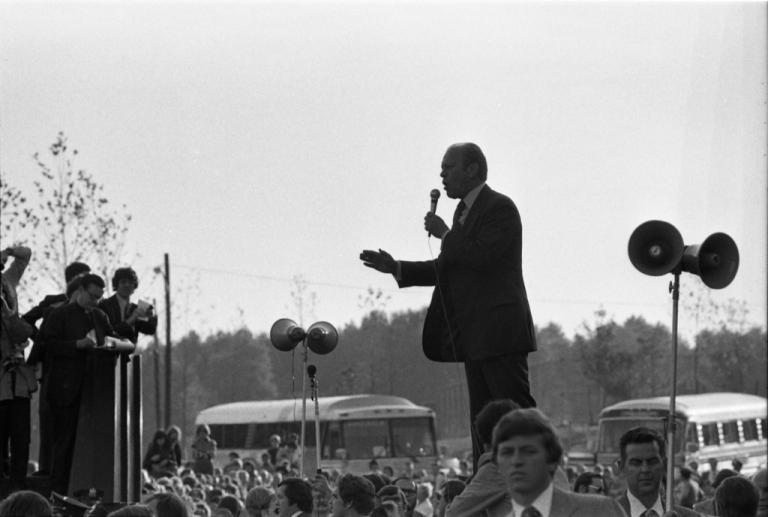The different strains of Christianity have different approaches to politics, based on their assumptions about theology and church polity. Baptists focus on individual liberty. Methodists seek social perfection. Calvinists criticize the culture and want to take it over. Lutherans. . .well, that’s a little complicated.
That’s the takeaway from Mark Tooley’s article, based on a talk he gave at Southwest Baptist Seminary, Methodist vs Baptist Political Theology.
He says of Baptists,
Baptist social and political engagement deduces from its commitment to soul liberty, the purity of the church and evangelism. Its congregationalism and democratic governance, without bishops or presbyteries, surely also are important. They all fed a zeal for religious liberty, for free speech, for aversion to centralized authorities, for commoners over aristocrats. Commitment to the Bible’s straightforward authority unmediated by ecclesial tradition perhaps also fuels commitment to strict constitutionalism. All of these Baptist assumptions have guided their devotion to and impact on American democracy.
As for Methodists,
Methodists emerged from a state church and so are not so separationist. Methodists usually have bishops, are governed by conferences, and don’t own their church property. This makes them perhaps friendlier to central authority and more supportive of government action. . . .
Methodists, like Baptists, believe in conversion and in confidence about salvation. But Methodists have a special focus on holiness, entire sanctification and perfection. This belief in personal perfection has transposed into forms of soaring political perfection that can be idealistic, ambitious and fraught with danger.
Tooley, a conservative Methodist, focuses on these two traditions, the two varieties of what he calls “democratic revivalism.” That is a useful label! Notice how big campaign rallies of every party resemble religious revivals, in their structure, fervor, and intended effect!
He spends most of his time describing the political influence of Methodism. His linking of the Methodist doctrine of moral perfectionism to social perfectionism is brilliant and explains a great deal. He says that the high point of Methodist political influence was the passing of Prohibition by Constitutional amendment, no less.
Methodist political perfectionism has manifested itself in the social gospel, the social reform movements of the 19th century, and the Marxist-infused liberation theology of the 20th century. The state church connection makes for an openness to government that tends towards political liberalism. But not necessarily. Methodist moralism has given us culturally conservative moral crusades as well.
I would add that today’s schism in the United Methodist Church over the acceptance of homosexuality shows a conflict between two kinds of Wesleyan perfectionism: the emphasis on personal morality, as defined in the Bible vs. the emphasis on social morality, as defined by the canons of woke progressivism, a social gospel that pervades mainline Protestantism.
Tooley briefly mentions Calvinism, which he says “remains the dominant intellectual force in orthodox American Protestant and Evangelical life.”
Most of the original modern Religious Right was Calvinist influenced. Francis Schaeffer, a conservative Presbyterian from Westminster Seminary, artfully welded traditional American post WWII Cold War conservatism with a Calvinistic critique of society and history.
I would add that the strain of Calvinism that has a “one kingdom” theology (not all of them do) contributes the notion that Christians should take over the secular realm, including the government. This can be found in Reformed “dominionism,” which can also be found in the Pentecostal “New Apostolic Reformation.”
So how about Lutheranism? We Lutherans never get invited to these parties. But let’s see if we can figure out where Lutherans fit in with all of this.
Taking Tooley’s emphasis on the effects of church polity, Lutherans do come from a heritage of a state church, with which it has often been in tension. This is especially true of conservative Lutherans in America, who migrated here precisely to escape the state church and the baleful influence of the King in promoting the Prussian Union.
Luther’s doctrine of the Two Kingdoms means that church and state are different realms, but that God is the king of them both, so that, by virtue of vocation, He does work through earthly governments. At the same time, though–and this is a point Lutherans have sometimes missed–earthly government is subject to God’s moral law.
This, I suppose, would manifest itself in a tendency to be politically conservative, due to the sense that God is already at work in the status quo, combined with a heightened awareness of sin, including in the government. This keeps Lutherans skeptical of utopian schemes of every variety.
So Lutherans, though anti-revolutionary, agree on the importance of this world and are capable of trusting in government up to a point. The church, though, must concentrate on spiritual issues and must never become entangled in politics. Individual Christians, though, in their vocation as citizens, are free to do so. Thus, both political conservatives and political liberals can be found among Lutherans.
Lutherans, being mostly late-coming immigrants, have had less influence than the other groups in the U.S.–though Madison, with good reason, credited Luther’s Two Kingdoms theology for the separation of church and state. But Lutheran social theory has been influential in Europe and has had free reign in Scandinavia, where it is credited with the invention of the welfare state. This is because Lutherans believe the government is under the Law and that Christians in government have a vocational responsibility to love and serve their neighbors by helping their citizens.
The bottom line, I suppose, is a conservative but activist government that helps its citizens. This sounds like the big government conservatism of Donald Trump and the “new conservatives.” This also accounts for what I keep reading in The Federalist, which has a number of Lutherans as editors and writers.
I am aware that I have been arguing against that model in favor of a more libertarian emphasis that I now see is Baptist. Some big government conservatives are going so far as to call themselves “social-democratic,” which would put them right up there with the “nordic model” of “Lutheran socialism.”
But I must not go so far as some of the new conservatives with their Catholic “integralism,” which derives from the Roman Catholic polity of the pope exercising temporal power enforced by a Holy Roman Emperor. That complete rejection of liberal democracy is, ironically, more like the Reformed and Pentecostal dominionists, whom as a Lutheran I must also reject.
Do I need to rethink my approach to politics? Or does Two Kingdoms theology also teach me that my approach to politics doesn’t matter all that much?
Help me out here.
Photo: President Gerald Ford at campaign rally, Union, New Jersey (1976) by Office of President of the United States of America, via Picryl, Public Domain













